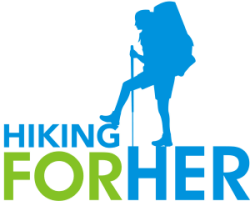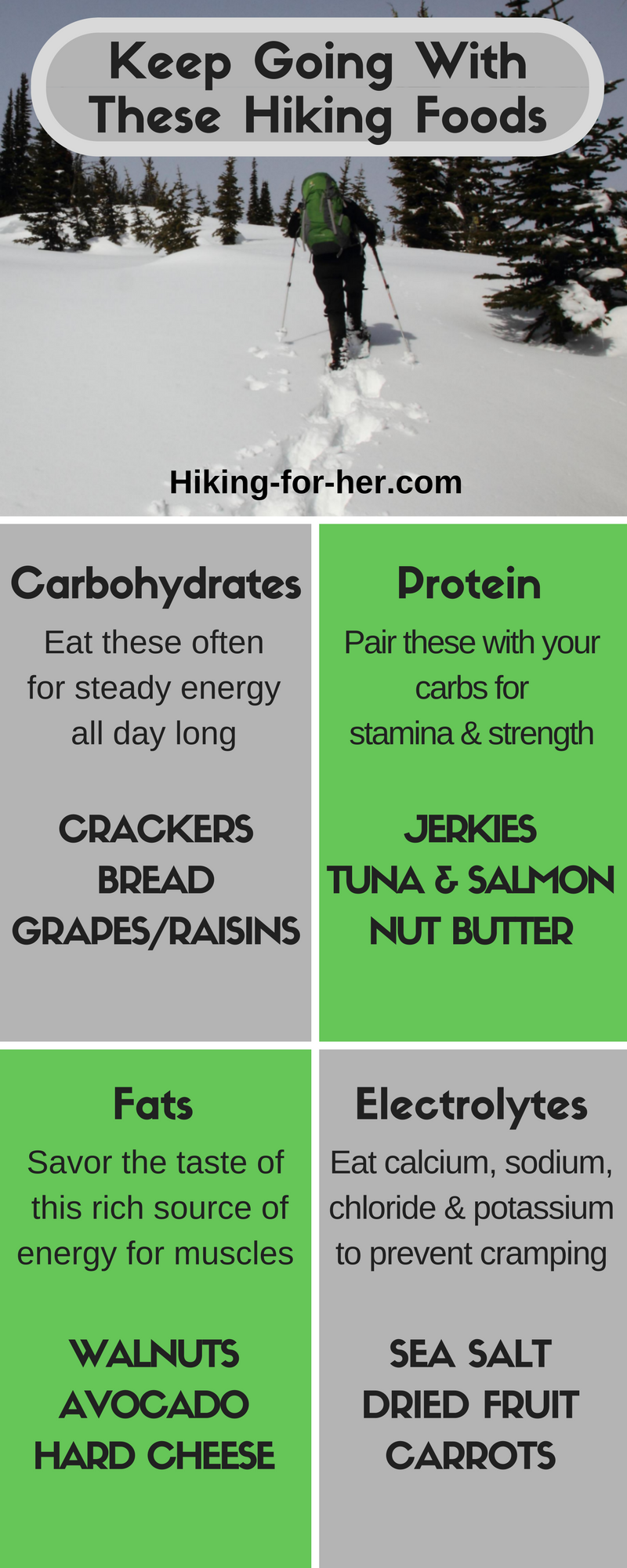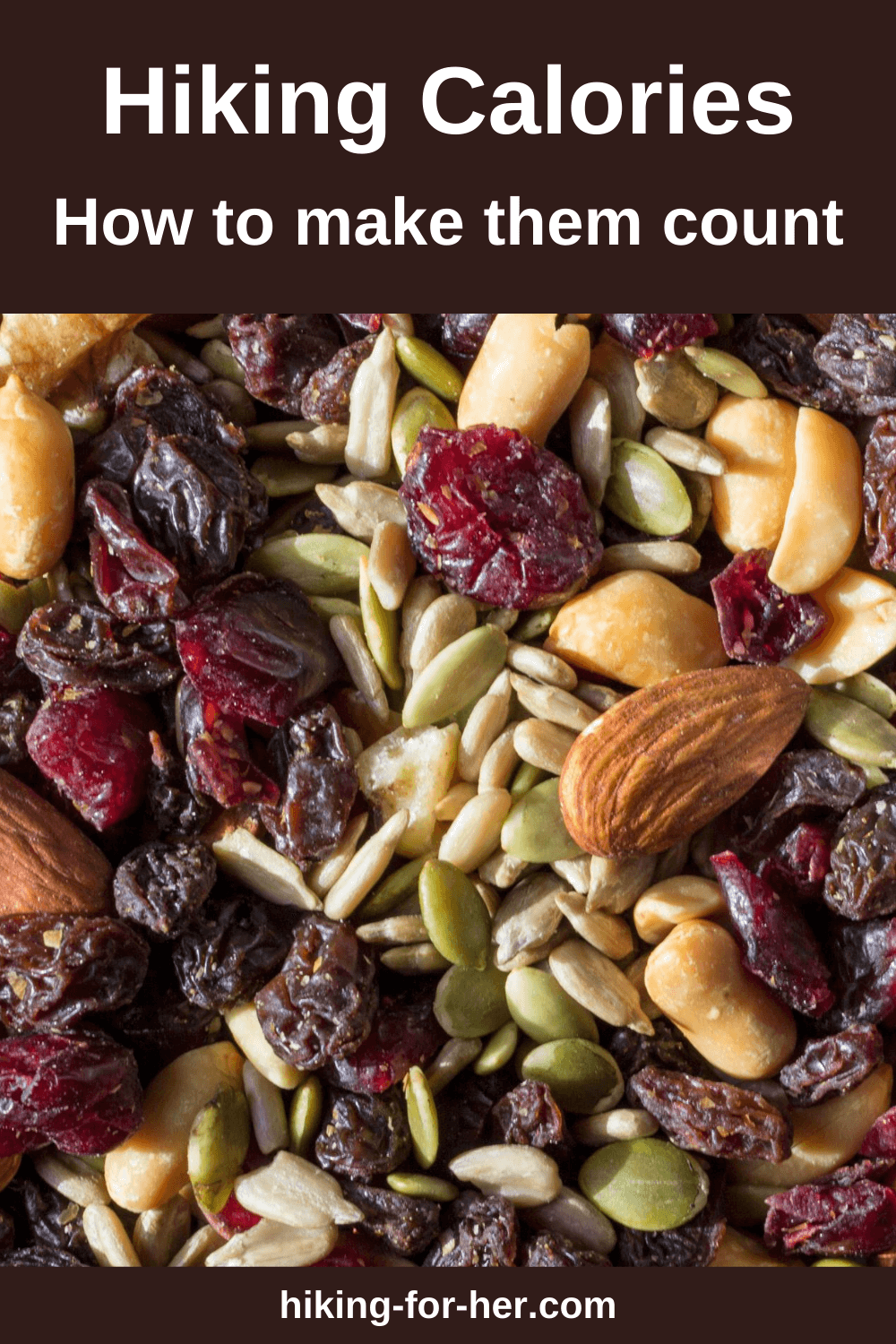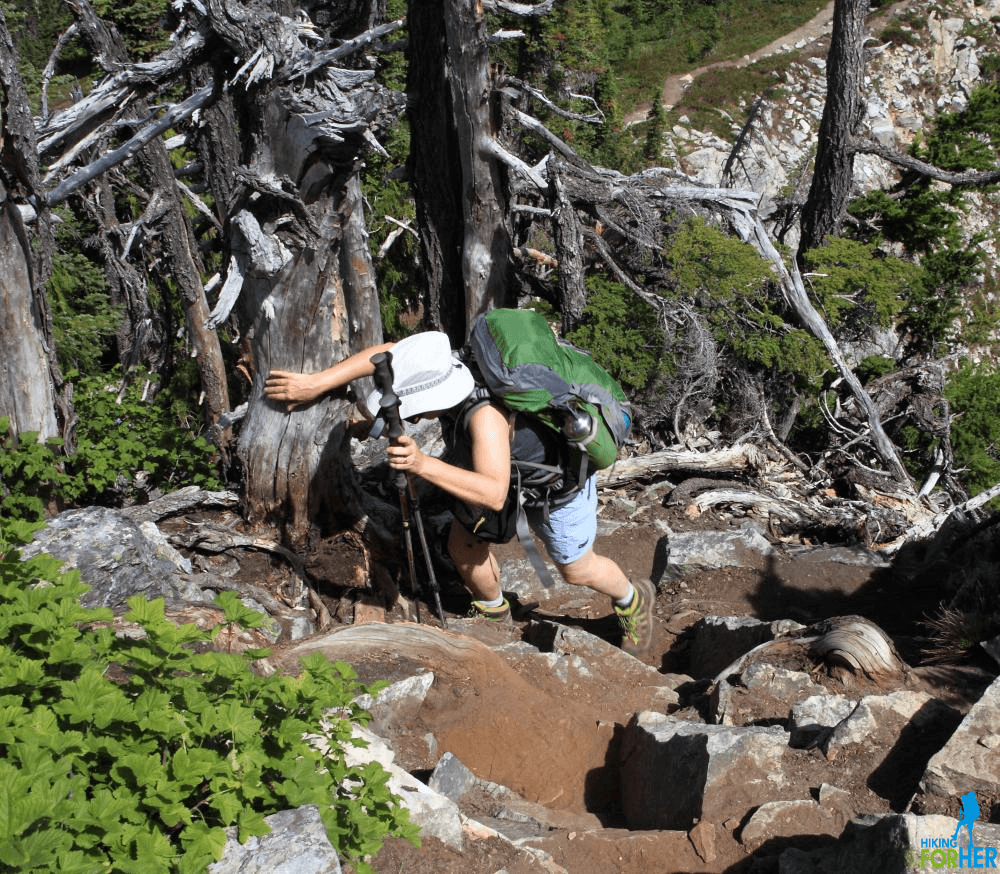Hiking Calories:
You Need Enough Fuel For Your Body
By Diane Spicer
Hiking calories: spend them freely.
So what does that mean?
It means prepare your body before each hike by eating adequate amounts of nutrients so you have a ready supply of hiking calories.
And during your hike, especially if it's uphill and hot, or long and cold, or anything other than a walk in the park, focus on your energy level.
- If you're sluggish and feel a bit weak in the knees, you need more calories. Or maybe water!
- If you're wired and filled with a glorious sense of boundless energy (I call it my Sound of Music "the hills are alive" sensation), you're right where you need to be in terms of hiking calories.
- If you've hit a wall and can't take one more step, eat something!
So what is a calorie?
That depends on who you ask.
Nutrition text books are filled with scientific definitions. I'll leave that for you to look up on Wikipedia (don't let the "kilocalorie" thing throw you).
To a hiker, a calorie is your ticket into the back country, or up to a view point.
It's the way your body "pays for" your movements, your breathing, your cellular repair of damage and injury, and your thinking process: all very important to a hiker, I'm sure you would agree!
A calorie translates into energy.
Hiking calories = hiking energy.
Differences in energy sources
But there are different ways to get those energy sources into the human body (although all of them depend upon a healthy digestive system).
In the United States, we seem to be obsessed with calories - namely, avoiding too many of them.
As a result, our food packages have lots of information about calories.
Turn that wealth of information to your advantage!
By reading the labels, you can determine where your hiking calories are coming from: fat, carbohydrate, or protein.
And why do you care? Because that information translates directly into how you feel and perform on the trail.
Quick hiking rules for the Big Three sources of calories
- Carbohydrate consumption gives you "quick" energy because you begin digesting starches (carbs) the moment they enter your saliva-rich mouth.
- Proteins and fats take a longer time to be converted into energy, because they require more intensive digestive and transport processes. They supply sustained energy, giving you endurance and stamina.
In my humble opinion (I'm no expert), average hikers should lean toward more carbs than fats while on the trail for a steady supply of hiking calories.
Caveat: If you adhere to a keto diet, you avoid calories like the plague. Your body has adapted to converting fats and proteins into energy.
But for the rest of us? The day before, and the day after, a hike, you want a more balanced mix of calorie-supplying foods.
- This ensures strong muscles and stored glucose (as glycogen) and fat (as adipose) to keep you going strong.
Expert opinions on hiking calories
Let's turn now to more expert opinions on the right amount of calories for hikers.
The International Society of Sports Nutrition (ISSN) recommends general dietary guidelines for what they call "athletes participating in a general fitness program": folks who exercise 30-40 minutes a day, at least 3 times per week.
They suggest that a "normal diet" of 1800 - 2400 calories a day (or 25-35 calories/kg/day for a 50 - 80 kg adult), should be giving you all the calories you need.
OK, that's fine for those of us who go for daily walks (a great habit to get into, year round, to keep your hiking muscles limber).
But what if you hike every week, for longer than 30 minutes at a crack?
Ah, that bumps you up into the category of "athletes involved in moderate levels of intense training".
What should a hiker eat?
ISSN recommends eating nutrient dense energy bars and high calorie carbohydrate/protein supplements to maintain energy during training -or hiking, as the case may be.
And now the question becomes: which ones?
Good question.
I wish I knew the answer.
- I only know the ones I use and which seem to work for me.
But I have some general thoughts to share.
Having taught university level biochemistry, I know a few things about what cells need to produce energy.
Science alert!
Skip this if you don't like biochemistry...
Adenosine triphosphate, or ATP, is like dollar bills (or any other type of currency) to cells.
- It's how they pay for moving molecules across their membranes, or building structures for support or healing, or pulling apart huge nutrient molecules like proteins.
- Without ATP, the cell stops breathing, working, repairing. You don't want that to happen!!
So what's a hiker to do to get enough energy?
So if generating ATP is the goal, how do we help our cells make lots of it?
Give them oxygen and the necessary building blocks.
How do we do that?
Well, we're getting plenty of oxygen as we're hiking - notice how you breathe harder when you're working hard?
As for the building blocks, we need to eat smart.
That's where hiking calories come in.
Let's take a quick tour of our options as hikers.
Carbohydrates: hiking gold on the trail
Let's start with the ISSN recommendations about carbohydrate intake.
They feel confident that a person in the "general fitness program" category gets enough carbohydrates (carbs, or CHO's) through their regular meals - no need to add extras.
A diet composed of 45-55% CHO (3-5 grams/kg/day) should be plenty.
I don't know about you, but I don't tend to weigh my food before I eat it. So I'm not exactly sure if I'm getting the correct amount, but I rely upon my energy levels to let me know if I might need to eat more carbs.
And where should our carbs come from?
They recommend complex carbohydrates which are a bit slower to be pulled apart for energy, things like whole grains, vegetables and fruits.
I highly recommend quinoa, an ancient grain with a complete amino acid profile (highly unusual for a grain).
Complexity galore!
And to make things even more complicated, there are different types of carbohydrates, which should be ingested at different times. ISSN guidelines talk about that, too.
So let's translate this recommendation into a hiker's lunch.
Whole grain bread, a few finger foods such as carrot, celery, red pepper sticks, and some apple or orange wedges.
Caveat: In cold damp weather, cold damp finger foods are unappealing.
Turn to carb-dense foods like crackers, bread, bagels instead.
Read more about how to get fast hiking energy through carbs here.
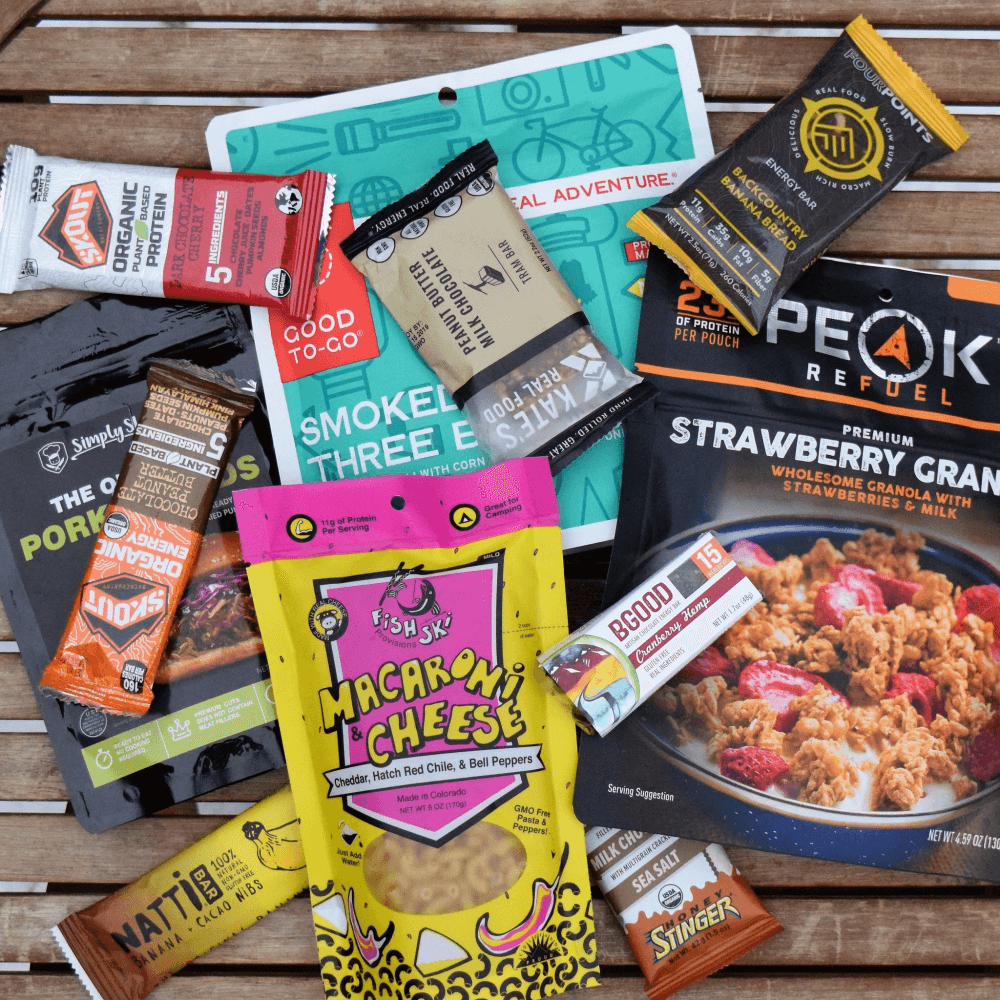 So many choices!!
So many choices!!
But where's the protein??
Good point.
Protein rebuilds your tissues and keeps your immune system strong, among other things, so it's an important part of a hiker's food intake.
ISSN recommends 10-15% protein in your diet if you're getting regular exercise (0.8-1.0 grams/kg/day).
They throw in an interesting tidbit about older people (they don't define "older", unfortunately): they need a bit higher intake, say 1 - 1.2 g/kg/day.
And here's where you can put something between your slices of whole grain bread:
- lean meats or nut butters
- egg salad
- tofu salad
Or skip the sandwich and opt for:
- handfuls of unsalted raw nuts
- salmon, beef, pork, lamb jerky
Protein notes for hikers
Oh, and about the protein: there are different types of them, too.
Pay attention to your sources of low fat, high quality proteins.
Here's a great source of protein, low fat and carefully sourced bison jerky which is useful for a trail lunch or post hike snack.
- Backpackers can cart this along as a lightweight but protein packed addition to dried grains.
- More backpacking food ideas here
So what's left to think about hiking calories?
Fat.
Not how much you have on your body, but rather how much and which types of fat you're eating.
ISSN guidelines indicate that a diet composed of 25-35% (0.5-1.5 grams/kg/day) will do the trick for moderately active people.
Are you beginning to see why food labels are a good idea?
At a glance, you can estimate your daily intakes and calculate whether your hiking calorie needs are being met.
Fat is a necessary building block for making energy, as well as storing up energy for future needs.
So some hiking calories absolutely must come from fats: oils and butters.
Counting grams of fat (again, the food labels!!) will give you a good idea if you're in the right range for meeting your energy needs.
A few suggestions for your hiking lunch:
- cream cheese or vegan cheese on a sandwich
- BabyBel cheese balls (covered in wax)
- avocado slices over your sandwich filling
- high quality raw nut choices
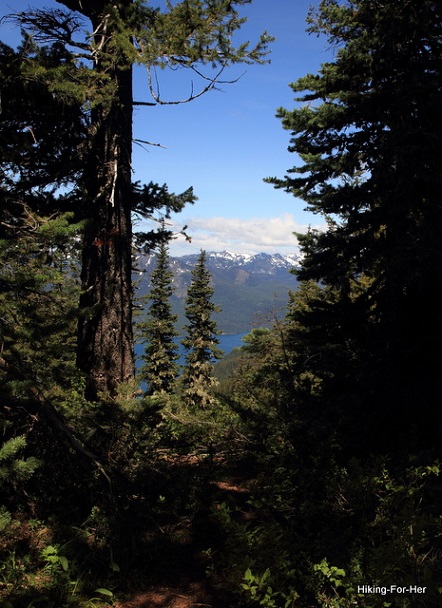 Hiking calories - spend them wisely so you can get to your hiking destination feeling great.
Hiking calories - spend them wisely so you can get to your hiking destination feeling great.
Back to our hiking lunch preparations
So here's how to mix things up a little: add a bit of fat with sliced cheese on top of your turkey, or half an avocado on top of tuna, or buttered bread, or oil rich nuts.
Just don't over do it.
Fats are harder to digest, and could lead to digestive distress if you consume too many while hiking.
Plus, they easily convert to hard-to-miss fat deposits, especially for women.
- Exception: medium chain fatty acids in coconut are burned rather than stored, so toss some coconut flakes into your trail mix.
- More trail mix ideas here.
So go heavy on the carbs, lighter on fats and proteins.
And don't neglect your electrolytes. Carry handy little packets for your water bottle, like these.
Watch out for signs of inadequate nutrition
Things to watch for as possible signs of inadequate nutrition for your activity levels:
*slow recovery times from a hike: days, not hours, to feel strong again.
*soreness that seems out of proportion to the hike.
*chronic injuries that just won't go away.
*lightheaded or dizzy sensations during your hike.
*delayed healing times for straightforward cuts or bruises.
*food cravings, indicating that your body is either begging for certain nutrients, or is allergic to something you're eating.
I recommend using a professional nutritionist for specific advice about your hiking calorie needs, if you're serious about being the best you can be on the trail.
It's also possible that you're sensitive to gluten in wheat, rye and barley products.
What to do?
- Go gluten free and see how that feels on your next hike.
Hiking calories all wrapped up
Wow!
Isn't there a lot to think about in terms of hiking calories?
Experts can quantify it for you, but only your body knows if you're getting the right balance of nutrients.
Here's a way to figure out exactly what you need, nutrient wise, for your hiking trips.
Home page > Hiking Food >
Hiking Calories
|
I get emails all the time about what I wear, eat, carry and love to use on the trail. That's
why I provide affiliate links to you: the best gear that I use myself and have seen used by other hikers is instantly
available for your consideration, and the gear company sends a few
pennies per dollar to this reader-supported hiking website. There is no added cost to you! Everyone ends up a winner: Great gear for you, strong gear companies, and more free hiking tips for everyone. Thanks very much for your support. It's warmly and sincerely appreciated. It also helps send these hiking tips to all your virtual trail buddies around the globe. |
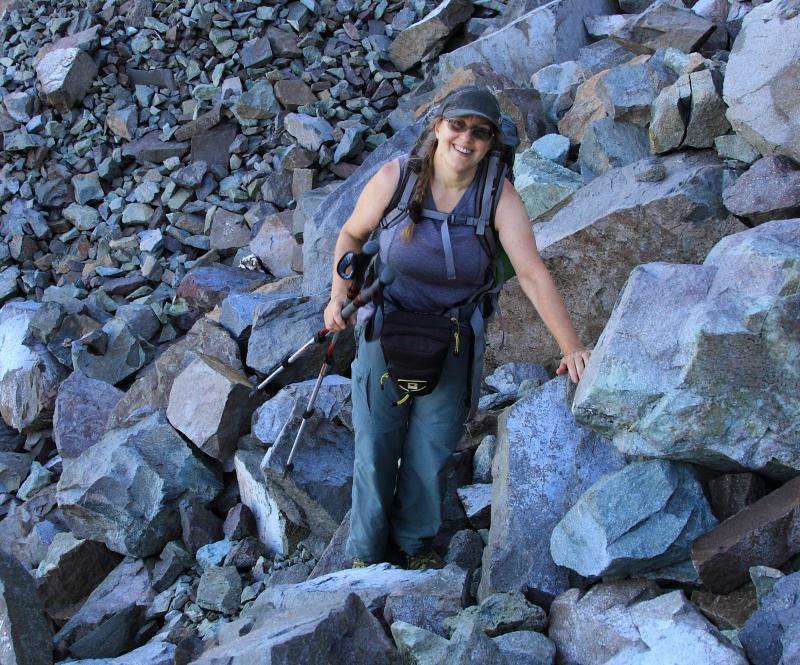 |
